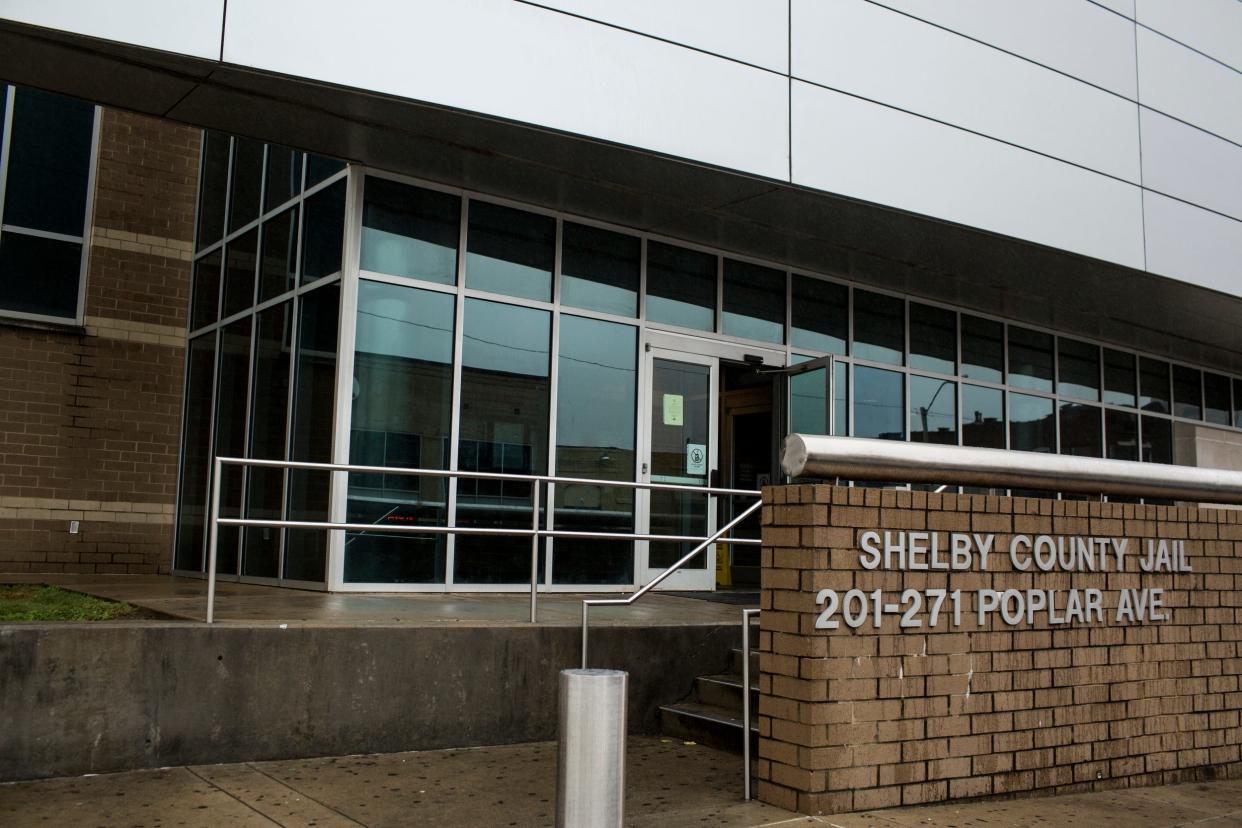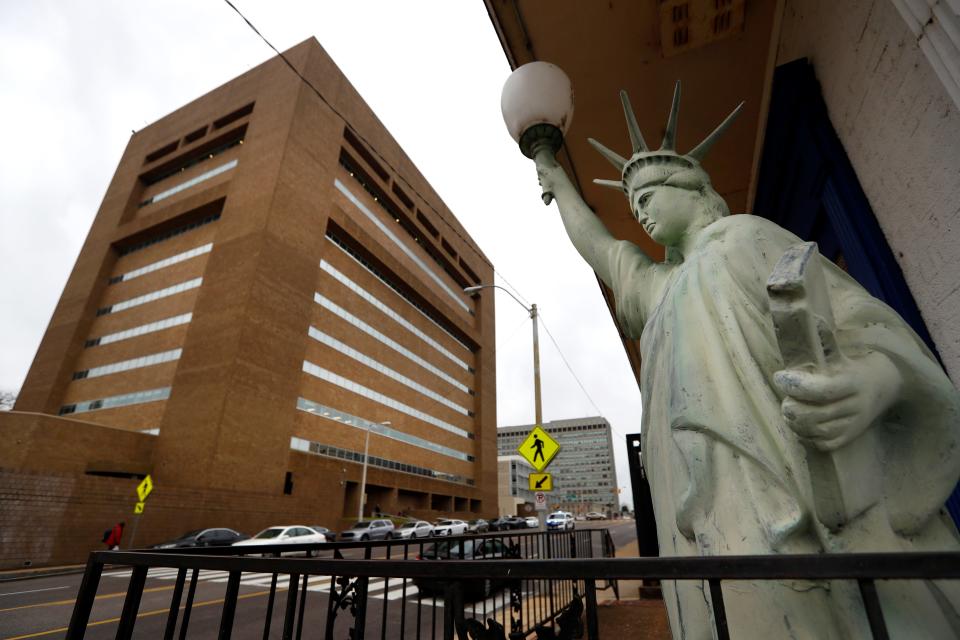Fewer people arrested while out on bail since reforms, Shelby County court data shows

The percentage of people being arrested while out on bail is lower since the bail hearing room was opened in mid-February this year than it was during a six-month span leading to the room's opening, data from Shelby County General Sessions Court indicates.
The data, which was presented in a specially called session of the Shelby County Board of Commissioners Monday afternoon, looked at almost 9,000 cases that took place in general sessions court from Aug. 1, 2022, through Jan. 31, 2023, along with just over 8,200 cases that took place from Feb. 15, 2023, through July 31, 2023.
The first six months of data compiled for the session — referred to by commissioners as "pre-bail hearing room data" — showed that 11% of people on pretrial release were arrested before the case was disposed in general sessions court. Since the bail hearing room was opened — dubbed "post-bail hearing room data " — that percentage fell to 7%.
Lead Judicial Commissioner John Marshall acknowledged the small sample size but said that the data they presented showed those who were re-arrested tended to be charged with domestic violence, shoplifting and minor thefts.
"I did not see a pattern of someone committing a violent crime — like a carjacking — bonding out and then committing another carjacking," Marshall said after the session ended. "I think that the public's perception that people are getting out and going right back to doing, committing the same type of crime, I don't think it's that simple."

The data does come with a caveat, however. The arrests stop as soon as someone's case finishes in general sessions. Once a case moves to criminal court following an indictment, Shelby County General Sessions Judge Bill Anderson said they are not able to track re-arrests.
"Anytime you give them a long period of time before you take care of a case, the chances of re-arrest grow greater," Anderson said. "If you have a case that languishes in criminal court for four or five years, and you're out on bond, the chances of you picking up another case are a heck of a lot better than if you have one down in general sessions court that is in and out of there within six months. You're going to have higher numbers if you follow it to the criminal courts."
Shelby County Commissioner Mick Wright, who called for the report to be presented at the special session, said the downward trend is a good start. He added that more data will be needed for more accurate comparisons, and to see where funding is needed.
"It is a bit of a dip, and that's a good thing," Wright said. "It's also a different time period, so different months you're looking at throughout the year. I'd want a longer period of time before I made any hard and fast rules. But I do like the fact that we're looking at this longer period of time, six months... and we'll be continuing to follow this every quarter. We'll be able to get a better sense and a longer perspective of what is actually happening on the ground, and not just case by case, but an overall sense and objective sense of what's really happening."

Why Anderson favors recognizance releases
Anderson spent a portion of Monday's presentation explaining why he favors releasing certain defendants of their own recognizance — which allows people accused of crimes to be released without paying money. Being released on your own recognizance, commonly referred to as being RORed, can also come with judicially imposed requirements that are enforced by pretrial services.
When defendants post monetary bail, and post through a bail bonding company, those restrictions cannot be enforced by the courts and are instead enforced by the company, Anderson said. He added that those companies often do not enforce restrictions when someone uses them to bond out of jail.
"One hundred dollars and pretrial services is out, they do not supervise," Anderson said during the presentation. "I could put conditions on that $100 bond, but nobody's going to enforce it. And I can't make anybody enforce it because I don't have any control over the bail bondsmen.
"They don't sit in a courtroom, they don't monitor anything. They don't do anything but collect money from poor people."
Anderson said when he releases defendants on their own recognizance, he can set curfews and require drug testing, mental healthcare and other services.

Bail, as it was created, is a means to ensure that someone shows up to court. After a case has reached its disposition, that money is returned to the defendant, though sometimes less than the bail amount due to court fees being deducted. When a bail bonding company is used, that money returns to the bondsman and the defendant does not get money returned to them.
Anderson also said that they are required by law to consider first if releasing someone on their own recognizance is a viable option, with the exception of a few serious crimes.
"In the time I've practiced law, it amazed me how people would show up for court when they are charged with a heinous crime, and they would show up to court every time even if it was a recognizance release," Anderson said. "And knowing that they're probably going to end up in a state penitentiary once their case is done."
'They're scared for their safety'
According to Anderson, the attention surrounding the bail hearing room has some judicial commissioners scared for their safety.
"They're scared," Anderson said. "They're scared because of the media. They're scared because if their name gets publicized as having set a bail in a particular case, they're scared for their safety. And I don't blame them one bit. I told them, 'I'm sorry, that's part of the job.' I've had threats made, and I can handle it."
More: What federal judges’ rulings reveal about the Memphis Police tactics
Wright asked if commissioners were afraid to set bail too high, but both Marshall and Anderson said they were unequivocally not afraid of that.
"I think what they are mostly afraid of is if they set a bond that is perceived to be too low," Anderson said. "There's a lot of nuts in this town, as we all know. There are a lot of strong feelings about crime getting worse. It takes one nut out there to read one bond that they thought someone did [too low], find out where that person lives — and they know where they work. They're more afraid of that.
"And there's nothing we can do about that. Our commissioners, they may have fears, and I know they do, but that's part of the job."
Lucas Finton is a criminal justice reporter with The Commercial Appeal. He can be reached at Lucas.Finton@commercialappeal.com and followed on Twitter @LucasFinton.
This article originally appeared on Memphis Commercial Appeal: Fewer arrested while out on bail since reforms, Shelby Co. court data shows

